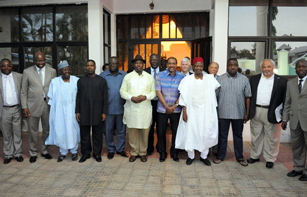
Feature Story
Nigerian governors commit to stopping new HIV infections in children
25 April 2012
25 April 2012 25 April 2012
UNAIDS Executive Director Michel Sidibé and U.S. Global AIDS Coordinator Ambassador Eric Goosby met with State governors during their visit to Nigeria. 24 April 2012.
Credit: UNAIDS/P.Ekpei
In a round-table discussion on Tuesday, high-level representatives from six Nigerian states committed to working with the Joint United Nations Programme on HIV/AIDS (UNAIDS) and the U.S. President’s Emergency Plan for AIDS Relief (PEPFAR) to eliminate new HIV infections in children. The meeting came at the start of a joint two-day mission to Abuja by UNAIDS Executive Director Mr Sidibé and Ambassador Goosby, the U.S. Global AIDS Coordinator.
The six Nigerian states represented at the discussion were among the priority states identified for urgent implementation of a national scale-up plan to eliminate new HIV infections among children.
“Even though policies are formed at the national level, only if you assume leadership can new HIV infections among infants be eliminated in your states,” said Mr Sidibé, addressing the Governors of Kano, Benue and Nasarawa States as well as the Deputy Governors of Cross River, Akwa-ibom and River States.
Nigeria carries about one third of the global burden of mother-to-child transmission of HIV. It is one of 22 priority countries of The Global Plan towards the elimination of new HIV infections among children and keeping their mothers alive—a roadmap to ending new HIV infections among children worldwide by 2015.
During the meeting, Mr Sidibé saluted Nigerian President Goodluck Jonathan for participating in the launch of The Global Plan last June at the United Nations in New York. Together with Ambassador Goosby, he suggested that a few key Nigerian states, in close collaboration with UNAIDS and PEPFAR, could step up efforts to end mother-to-child transmission of HIV.
Even though policies are formed at the national level, only if you assume leadership can new HIV infections among infants be eliminated in your states
UNAIDS Executive Director Michel Sidibé
Ambassador Goosby acknowledged the importance of the gathering. “These governors recognize the importance of addressing paediatric infections in their respective states. Their leadership will not only help Nigeria reduce the number of infants from being infected by HIV, but it will help advance the overall goals of The Global Plan,” he said.
Benue State in north-central Nigeria has an HIV prevalence of 10.6%—the highest of any state in the country. Calling himself a strong advocate for ending HIV, Benue State Governor Gabriel Suswam said that he often takes HIV tests to encourage others to go for testing.
Nasarawa State Governor, Umaru Tanko Al-Makura, said his State has an agency that supervises the care of people living with HIV and is ready to cooperate with efforts to eliminate mother-to-child HIV transmission.
The discussion ended with a call by Kano State Governor, Rabiu Kwankwaso, to create an event that would shine a spotlight on HIV and ensure that the issue came to the forefront once again in Nigeria.
During the joint mission in Nigeria, Mr Sidibé, Ambassador Goosby and other participants in the delegation—including Peter McDermott of the Children’s Investment Fund, Anil Soni of Business Leadership Council and other members of the steering group for The Global Plan—will meet with high-level government officials, business leaders, and representatives from civil society and the inter-faith community. They will also commemorate victims of last year’s bomb attack on UN House in Abuja.



